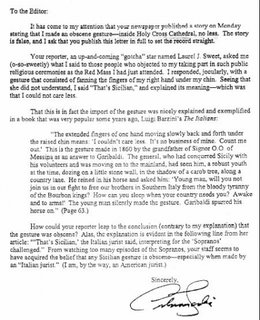They Call This News?

 So why is there such a fuss about the meaning of the gesture Supreme Court Justice Antonin Scalia made to a journalist after attending Mass at the Cathedral of the Holy Cross in Boston last Sunday? The journalist, Laurel J. Sweet, asked him whether his participation in Sunday’s special Mass for lawyers might cause some people to question his impartiality in matters of church and state. Scalia responded by flicking his chin and saying, "It’s none of their business, this is my spiritual life and I shall lead it the way I like.” He also said about the gesture "That’s Sicilian for the Sopranos challenged" and "don't publish that".
So why is there such a fuss about the meaning of the gesture Supreme Court Justice Antonin Scalia made to a journalist after attending Mass at the Cathedral of the Holy Cross in Boston last Sunday? The journalist, Laurel J. Sweet, asked him whether his participation in Sunday’s special Mass for lawyers might cause some people to question his impartiality in matters of church and state. Scalia responded by flicking his chin and saying, "It’s none of their business, this is my spiritual life and I shall lead it the way I like.” He also said about the gesture "That’s Sicilian for the Sopranos challenged" and "don't publish that".
Now as I am of Sicilian decent I feel like I have a little something to weigh in on this issue. It is a gesture used mainly to say 'I don't care', or to show indifference. In fact, in the book Italian Without Words by Don Cangelosi and Joseph Delli Carpini, it lists the gesture to mean "Che me ne fotto?", translated as "What do I care?".
Members of the Sopranos cast gave their opinion of the episode here.
The first Boston Herald article on the subject is here, another one here, and the photographer who took the photos' opinion here.











